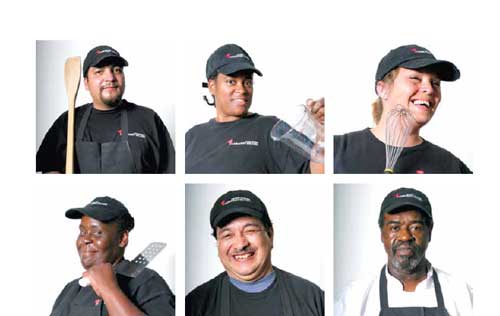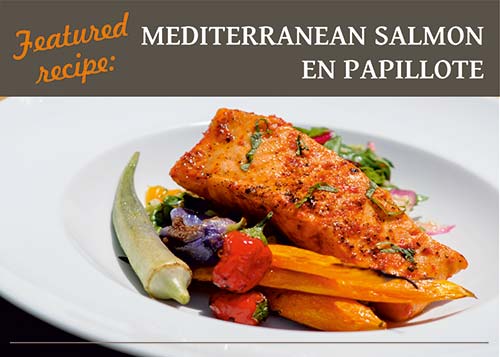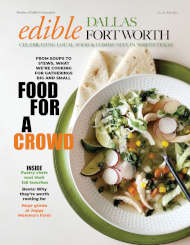
Photos by Karen McCullough
Eleven chefs-in-training, students at Tarrant Area Food Bank’s Community Kitchen, are cleaning up after lunch. Their mentor, Chef Vedat Lika, is showing a group of visitors around the agency’s shiny new kitchen when suddenly and without warning, from the upper reaches of a storage shelf, a carelessly placed utensil comes crashing to the floor narrowly missing Chef Lika’s head. He is not amused.
The culinary students in their crisp black chefs’ aprons snap to attention as the executive chef vociferously explains in no uncertain terms the proper way to store equipment. He is loud and he is stern, but the storm passes quickly. This is no “Hell’s Kitchen.”
Chef Lika’s merry eyes belie his New York swagger and it’s easy to see why he and his two counterparts, Community Kitchen Administrator Lylette Pharr and Career Coach Barbara Higbee, hold a very special place in the hearts of their students.
Life has already come crashing down on most of these budding chefs and for them the Community Kitchen training program is a muchneeded second-chance. Only nine weeks into the four-month curriculum, their lives have already changed immeasurably thanks to their own hard work and the support of this triumvirate who will shepherd them from the classroom to the workplace.
The Community Kitchen Culinary Arts Program and its recently completed 2,400 square foot commercial kitchen are the pride of the Tarrant Area Food Bank. Although this class is the seventh to come through the program, it is the first to have the benefit of these stateof- the-art facilities.
Launched in January 2007, the program provides a one-two punch in the Food Bank’s fight against hunger in thirteen North-Central Texas counties. The program’s mission is to provide free job training to promising low-income men and women while providing a culinary workforce for the agency. While honing their skills under the tutelage of Chef Lika, the students turn perishable donated food into nutritious meals for the Food Bank’s 300 hunger-relief agencies.
After fourteen weeks of training and a two-week internship, nearly ninety percent of the Community Kitchen graduates will find employment in the food service industry. For these special eleven who were chosen from seventy applicants, there will be hurdles as they move toward a more fulfilling life. The lessons they’re learning inside the Community Kitchen are designed to help them cope with whatever obstacles may tumble onto their paths.
CHRISTINA ALLEN – A SURVIVOR
Christina Allen was sleep walking through life when she finally hit bottom. A bad car wreck, the wrong friends, an abusive relationship. The sum total landed her in a homeless shelter during which time her children, a four-year-old son and an eight- year-old daughter, went to live with their father.
A recovering addict, thirty-four-year-old Christina is the first to admit that she has made some questionable life choices, but her children give her all the motivation she needs to put that in the past.
According to Barbara Higbee (Ms. B. to her students), Christina has achieved an incredible degree of personal growth since enrolling in the program.
“I almost lost my children and I almost lost myself,” Christina explains. “I’ve taken them through the bad times, now I am taking them through the good times.”
She credits administrator Lylette Pharr with teaching the students about their own selfworth and empowering them with a belief that they can succeed.
“This program will open doors,” she says, “but there’s also a responsibility that comes along with that. We are learning so much in a very short period of time.”
For that reason, Christina comes to class every day committed to work.
“Chef reminds us that in the real world we won’t be told three times how to do a task. We must listen. We don’t want to reflect badly on the program by not being prepared,” she says.
Although she doesn’t have her own apartment yet, she looks forward to the day when she’ll be able to cook with her children. She’s learned to avoid foods loaded with preservatives and sodium, and she has broadened her horizons by trying zucchini.
“Chef’s a single parent like I am,” she says. “He understands what we’re going through. Chef Lika says, ‘Don’t sweat the small stuff.’”
JOSE GUTIERREZ – JOE’S GARAGE AND TACO STAND
Twenty-eight-year old Jose Gutierrez has warm childhood memories full of cooking and good food. The Fort Worth native comes from a large family and he credits his mom with instilling in him a passion for the kitchen.
“As a kid, I liked grilling for groups,” says Jose, who worked in a variety of restaurants before landing a job at Napa Auto Parts, where he was surrounded by gadgets related to his other passion: cars.
Jose’s life took a dramatic turn when he was convicted and sent to prison for selling marijuana. When this father of three boys and two girls, all under the age of ten, was finally released, he had to face the reality that his record prevented him from resuming his previous employment.
“It’s difficult to get a second chance,” he says, “but my sister who works at the Women’s Center heard about the program. She knew how much I loved cooking and she talked me into applying.”
When he entered the packed room filled with eager applicants, he was convinced he wouldn’t be accepted.
“My self-confidence wasn’t so good, but I told myself that there was no harm in trying. The worst they could say was ‘No.’”
Surprised to be called back, Jose says that the interview process made him understand his need to create new goals.
“Truthfully, I wanted to change my life around. I hope to own a business someday that I can share with my kids.”
Being with his children is now one of Jose’s greatest pleasures.
“I love sharing what I’ve learned with them,” he says. “We make pizzas and homemade play dough. I’ve even taught them how great carrots can taste, especially with a sprinkle of brown sugar.”
Jose’s hope for the future is a business that will merge his love for the kitchen with his love for cars.
“Someday I’m going to open a garage with a taco stand next door. While the customers are waiting, they can relax and enjoy some home cooking.”
BERNITA DAW – NEW ORLEANS HERITAGE
Thirty-four-year-old Bernita Daw grew up on the edge of the New Orleans French Quarter with a deep appreciation for the area’s renowned cuisine.
“My father was the produce manager at Circle Foods,” she explains, “and my mama had a little business selling prepared dishes like dirty rice, jambalaya and cornbread dressing. I’d help her in the kitchen, then go with her to sell it to churches and various organizations.”
In 2004, a ruptured marriage brought Bernita and her children to Fort Worth where her sister was already living. A year later her parents joined the family after a harrowing encounter with Hurricane Katrina.
“We didn’t hear from them for a week and we were terrified,” she says. “They woke up to find water flowing into their bedroom. A man saw them on their porch and helped get them to the Convention Center.”
Her childhood home now stands muggy and empty.
Bernita was working in the healthcare field tending to the elderly when she met Ms. B., who told her about the Community Kitchen classes.
“Cooking is a part of my heritage and this is my dream,” she says, “but I still have so much to learn.”
When she first came to Fort Worth, she went to a local restaurant, now defunct, that specialized in Louisiana cooking.
“I couldn’t help myself,” she laughs. “I went up to the owner and said, ‘Excuse me, this crawfish etouffee is all wrong!’”
Recently Chef Lika explained to Bernita the correct way to make dark roux, the thickening base found in many Cajun and Creole dishes.
“I was a little skeptical but he knew what he was talking about, even if he is from New York,” she adds with a grin.
She loves being in the kitchen with her 15-year-old daughter, 10-yearold son and 16-month-old baby girl.
“This program has changed how we eat and cook at home. I’ve learned that zucchini and artichokes taste good. I take my time when I’m in my kitchen, and the family loves to watch and help, just like I did as a girl. When I bring home some of the wonderful food we make in class, the kids really love it.”
MIKE ALLEN – A HIGHER CALLING
The converging roads of Mike Allen’s fifty years have led him to the Community Kitchen’s doorsteps. Though some wounds are still too fresh to discuss, this Gulf War vet has great clarity about his future. He believes in a purpose greater than simply changing his own life: Mike Allen believes he can also better the lives of others.
Through the connections he’s making at Tarrant Area Food Bank, Mike hopes to open a branch of Loaves and Fishes, a Catholic Charities soup kitchen, where the emphasis will be on creating healthy meals.
“Shelters use whatever food is on hand,” he explains, “and often the nutritional element isn’t there because of the way it’s prepared. Chef Lika’s approach is different. He’s teaching us to squeeze every bit of nutritional value out of whatever food we’re given.”
Mike remembers the day Chef had them try a certain cream soup.
“I thought it was pretty good until I realized that he had mixed Swiss chard with pureed tripe. My stomach did a little flip-flop. Chef, who came to New York from Albania as a child, knows what it’s like to be poor and hungry. He is extremely skillful in the way he fuses his ingredients.”
Mike knows how it feels to be homeless and hungry, but he was recently able to leave his shelter thanks to the generosity of a friend.
“The shelter isn’t always a good environment for someone who is struggling with past demons,” he says. “There are lots of temptations there and it’s easy to slide back into the same old bad habits.”
Mike grew up in a close-knit family and though his childhood was happy, one of his most horrific memories from that time involves cooking.
“We were oil field brats,” he explains. “We lived in company trailer encampments near the oil fields.”
It was there that he and his younger brother burned down the family kitchen making peanut butter cookies.
“A frying pan with burning butter caught fire. My parents were angry but mostly relieved that no one got hurt.”
After high school, Mike spent a year at the University of California at Berkeley but after experiencing his first earthquake, he decided that the military was a better fit. For the next eight years, he served in the Navy and Marines, working as a hospital corpsman during the Gulf War.
“Military life was rigorous and I lost three siblings during those years,” he says. “My life spiraled into depression and drugs. Most vets who are homeless are also addicts.”
He calls Lylette Pharr’s self-awareness classes the most powerful he’s ever encountered.
“She makes you rewind the clock and face how you’ve gotten to this point. We’ve shed tears and we’ve laughed. The group has very few secrets.”
Even if he could have afforded another culinary school, he knows that this is the one that best meets his needs.
“It’s a privilege to be here. There’s nothing I’m ashamed of. Life has taken me down certain roads and I’m going to use what I’ve learned to make the world a better place.”
As a kid, TERRI TAYLOR refused to eat her vegetables. Her veggie-phobia was cured in 1977 when she spent eight months working on farms in Norway and France. She studied journalism at UT-Austin and received a master’s degree in liberal arts from SMU. Her short story “Virginia” can be found in Solamente en San Miguel, an anthology celebrating the magical Mexican town of San Miguel de Allende. She has written for Edible DFW since its inaugural issue in 2009. She became the magazine’s editor in 2010 and is the editor of Edible Dallas & Fort Worth: The Cookbook.











